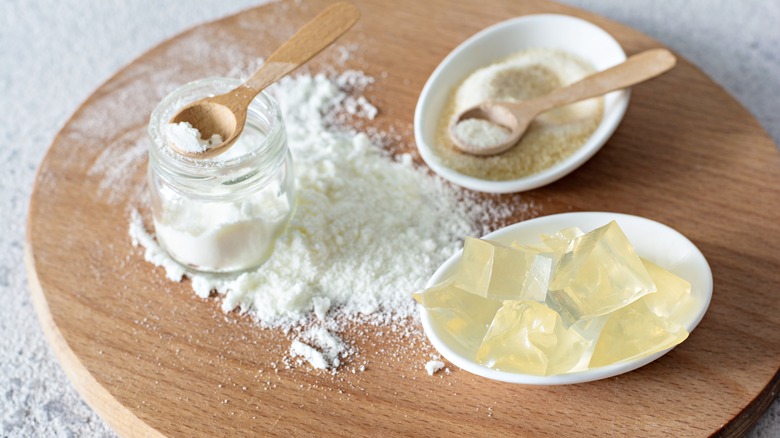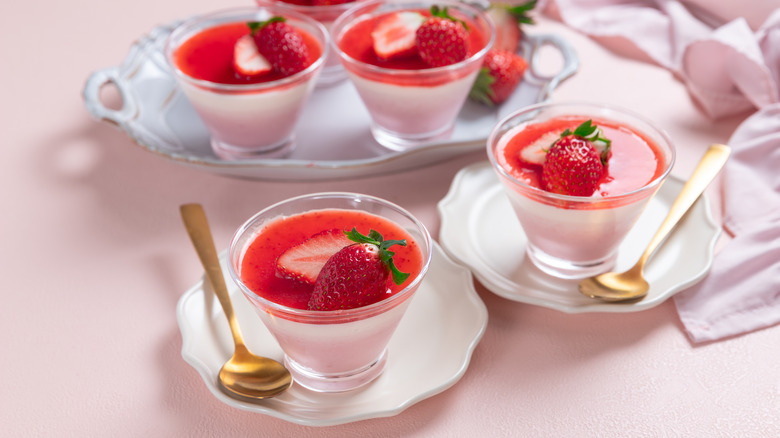Sea Moss Gel Is A Slept-On Ingredient For Vegan Gelatin
In the realm of vegan and vegetarian cooking, sea moss gel is a lesser-known ingredient that can actually be a lifesaver when veganizing gelatin-based recipes. Picture a scenario where you're hosting a gathering of friends, some of whom follow a plant-based lifestyle. You might decide to whip up a delicious dessert, perhaps a pudding or a creamy panna cotta, but you know that gelatin is derived from animal bones. Opting for sea moss gel instead not only ensures that the dish remains vegan- or vegetarian-friendly, but also introduces a rich source of minerals and nutrients.
Also known as "Irish moss," sea moss is a nutrient-dense aquatic vegetable similar to seaweed that is commonly harvested from the Atlantic Ocean. It's a species of red algae called Chondrus crispus. Irish moss has grown to be a cult favorite in the vegan community thanks to a derivative product known as sea moss gel, which acts as a versatile and nutritious thickening agent for various recipes, from gummy candies to mousses and other dishes traditionally reliant on gelatin.
Sea moss gel is the perfect gelatin dupe thanks to a natural compound called carrageenan, which is responsible for its gelling properties. This thickener creates a signature jiggly gelatin texture without compromising on flavor or ethical considerations. That being said, you may have also heard of agar-agar, a similar gelatin substitute also derived from seaweed. The two ingredients have a few key differences.
Sea moss gel versus agar
When it comes to gelatin substitutes, agar-agar might be the more familiar ingredient on the vegan and vegetarian scene. Similar to sea moss gel, agar is derived from seaweed and is free of animal byproducts like collagen, found in traditional gelatin. Agar primarily comes from the Gracilaria species of red algae, while sea moss gel, as said before, is made from the Chondrus crispus species. The preparation methods for these two ingredients also differ. Sea moss gel is typically made by washing, soaking, and then blending the threads of moss, while agar is most often removed from the seaweed and then synthesized into a powder or flakes before it is sold.
So why use sea moss gel over agar? Sea moss gel not only boasts natural gelling properties, but also a wealth of essential nutrients, including minerals and antioxidants. Unlike agar, which undergoes more processing, sea moss gel provides a more "fresh" and minimally-processed option, for those of us concerned about processed foods. Sea moss is also considered to be softer than agar and easier to melt, making it a better choice when making recipes like chocolate mousse or ice cream. Agar is known to add a more firm or brittle texture to gelled desserts, which is fine if you're not after a super-soft and wobbly result, but too much agar can actually make foods seem hard and possibly unpleasant.
A viral following
Sea moss has developed something of a cult following online, with loyalists touting its miracle ability to help with clear skin, immune support, and other health benefits. Experts agree that there are solid nutritional benefits to ingesting sea moss, either in gel form, or as a supplement or a liquid drop. Vitamins such as A, B, C, and E are plentiful in the product, as registered dietician nutritionist Samar Kullab told CNBC. These nutrients can help to reduce inflammation and support both heart and gut health.
Sea moss gel can even help balance the thyroid gland, although individuals with thyroid issues should stick to one serving per day and check with their health care providers. "Sea moss contains iodine which helps regulate your thyroid function," Kullab explained. "And iodine is something that our bodies can't produce, so we do have to ingest it."
However, beware of "miracle food" claims regarding sea moss, which can be exaggerated. Dr. Melinda Ring, the executive director of the Osher Center for Integrative Health at Northwestern University Feinberg School of Medicine, told The New York Times, "It's just not a magical thing that everyone should be taking," as it has not been studied in clinical trials. It's best to view sea moss gel as a great gelatin substitute that also carries a nutrient boost, rather than a sort of cure-all ingredient.


